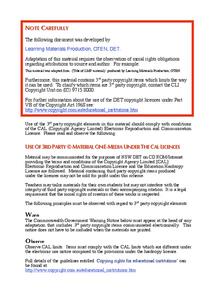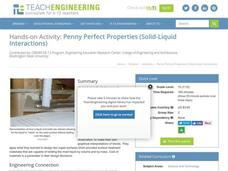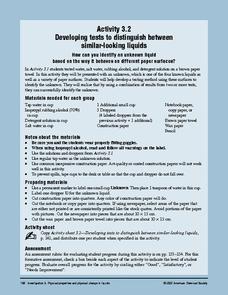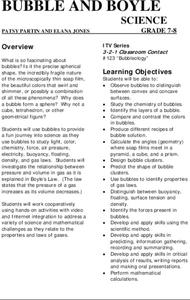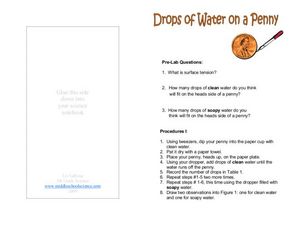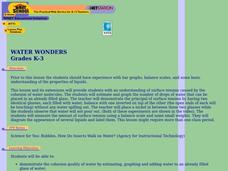Teach Engineering
Exploring Capillary Action
Explore capillary action from different perspectives. In the fourth installment of a nine-part series, scholars perform several experiments to observe capillary action. They look at the meniscus of water in a glass, observe capillary...
Teach Engineering
Capillarity – Measuring Surface Tension
How do cohesion and adhesion work together? The third installment of a nine-part series teaches young scientists the difference between adhesion and cohesion. They also learn how cohesion and adhesion work together to cause capillary...
Teach Engineering
Surface Tension Lab
What constitutes a good soap bubble? In the second installment of a nine-part series, scholars apply their understanding of surface tension to soap bubbles. They experiment to determine the best solutions to use for the...
Urbana School District
Fluids
In 1879, Sir William Crookes discovered the fourth state of matter, plasma. The presentation covers states of matter, phase changes, density, pressure Pascal's Principle, buoyant force, Archimedes' Principle, Bernoulli's Principle,...
SRI International
Science of Water
Water is crucial to survival. Scholars gain an appreciation for water by reading about it, learning about its atomic properties, and investigating its properties through six stations in a lab activity.
Millennium Schools
Lifestyle Chemistry
My name is Bond, Hydrogen Bond. Written for distance scholars working on chemistry at the high school level, the lesson includes eight weeks worth of material divided into six parts: substances you use, mixing it up, your skin, what's...
Teach Engineering
Penny Perfect Properties (Solid-Liquid Interations)
I can get more water to stay on a penny than you can! Collaborative pairs determine the volume of liquids that can be contained on the surface of copper pennies and plastic coins. The pairs analyze their results using graphs and go on to...
Curated OER
Penny Science
A penny can be a much more valuable teaching tool that you might think. Whether you are teaching about chemical reactions, surface tension, the behavior of gases, or are just looking for engaging activities for early finishers, this...
American Chemical Society
Developing Tests to Distinguish Between Similar-Looking Liquids
Each group talks about how to test unknown liquids based on their findings in the previous experiment. In this second of four activities, they test unknowns on wax paper, newspaper, and construction paper. As a stand-alone, this lesson...
Curated OER
Break the Tension
Students experiment with the concepts of surface tension. They participate in a number of different experiments that introduce them to surface tension. They work in a small group in order to conduct these experiments.
Curated OER
7.012 Fall 2004 Section Self-quiz
This quiz just looks neat! It has two cell diagrams for biology class members to label. They also describe the function of each organelle. A prokaryotic and eukaryotic cell are displayed for them to compare, and then they fill in the...
Curated OER
Call Me Bond, Hydrogen Bond
As amazing as James Bond is, the surface tension of water does not allow him to walk on it! In this series of little lab activities, physical scientists play with the properties of water due to the hydrogen bonds and resulting polarity....
Curated OER
Drops on a Penny
Young scientists explore the concept of surface tension at is applies to water. In this activity, learners use a dropper to place drops of water on a penny. Each group guesses how many drops a heads-up penny will hold, then conducts the...
Curated OER
Bubble and Boyle
Middle-schoolers still enjoy playing with bubbles! In this series of eight laboratory activities, science learners explore convex and concave surfaces, angles, gas laws, buoyancy, density and more!
Curated OER
Blow the Best Bubbles
Here is an exciting, and meaningful science lesson on the formation of bubbles! Young scientists have three cups with a variety of solutions in them. One cup has detergent only, one has glycerin added to it, and the third has corn syrup...
Exploratorium
Bubble Tray
Create jumbo bubbles and use them to teach about surface tension or interference, perfect for a physical science lesson on light or molecular attraction.
Curated OER
Testing Water Tension
Students explore and experiment with water to assess the cohesion and surface tension of water. They conduct comparative tests to study water molecules and then illustrate an insect taking advantage of water's surface tension.
Curated OER
Water Wonders
Students measure the amount of surface tension using a balance scale after a classroom demonstration students diagram the appearance of several liquids and label them.
Curated OER
Water
Students conduct a series of investigations on the unique properties of water. In this general science lesson, students explain what causes water's surface tension. They explain the different stages in the water cycle.
Curated OER
Fun with Surface Tension!
Learners explore physical science by participating in a water properties experiment. In this surface tension lesson, students utilize pennies, water, a dropper and soapy water to test the different surface tensions with numerous objects....
Curated OER
Drops of Water On a Penny
In this science worksheet, students learn about surface tension by performing an investigation with drops of clean and soapy water on a penny.
Curated OER
Water Wonders
Students experiment with the cohesion of water molecules. In this surface tension activity, students estimate how many drops of water a full glass can take before overflowing. They watch a video that explains water molecules.
Curated OER
States of Matter
In this states of matter worksheet, students complete a concept map about the three states of matter including solids, liquids and gases.
Reach Out!
Paper Clip Sailing
Students explore water, molecules, and surface tension. In this floatation lesson plan, students discover why some objects are able to float on water as they follow the procedures included in this activity.







